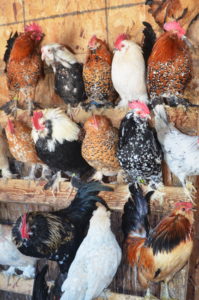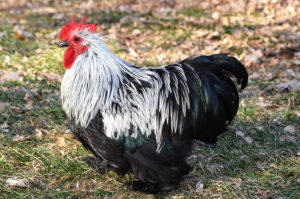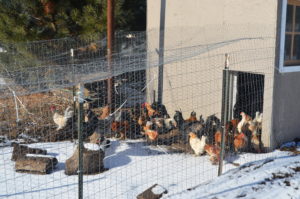Guest post by Valerie Boese from Homestead Hustle

Protect your flock with biosecurity measures.
All chicken owners and breeders should be aware of the recent breakouts of Newcastle disease in California and Utah. Two hundred ninety-nine cases of Virulent Newcastle Disease have been reported since May 18th in California, and there was one case confirmed last week in Utah which is believed to be linked to three chickens that were transported from California. The deadly disease has occurred mainly with backyard breeders and hobbyists. However, since Dec. 14, 2018, there have been three poultry production facilities confirmed with Newcastle disease, causing 500,000 chickens to be euthanized. The state of California and the USDA have been working around the clock to stop the spread of this fatal disease. As a result of these serious findings, California has mandated mandatory culling of all chickens healthy or sick in four neighborhoods in Los Angeles, Riverside, and San Bernardino counties, in efforts to stop the spread of the disease.

Healthy Birchen Cochin Rooster
Newcastle Disease
Newcastle disease is a highly contagious viral disease that is spread from one chicken to another by direct contact with body fluids and droppings. It can also be transmitted poultry by human clothing that has come in contact with affected areas. The virus can remain alive in manure droppings for up to 2 months. It can be fatal up to 100% of the time, affecting the respiratory, digestive, and nervous systems. Symptoms of the disease include swollen eyes, purplish color wattles, and comb, abundant discharge of fluid from beak and nostrils, twisting of head and neck, depressed appetite, runny stools, and sudden death. There is no treatment or cure for the disease; the only recourse is to cull sick birds and any other birds that were in contact with the infected birds. All types of birds can be infected with the disease, with a high death rate for chickens; while many other kinds of birds will show no symptoms, they can be a carrier capable of spreading the disease.

Mesh wire covered runs will prevent contact with wild birds.
Prevention is Key
Prevention is the best way to stop the spread of Newcastle disease; here are some recommended biosecurity measures to follow:
- Buy birds from reputable breeders that are NPIP certified and quarantine them for 30 days.
- Quarantine any birds that you took to a poultry show for 30 days.
- Strive to keep wild birds out of your poultry pens.
- Limit access to your birds by visitors
- Clean pens and disinfect them on a regular basis
OBSERVE YOUR BIRDS REGULARLY FOR SYMPTOMS AND REPORT ANY ILL BIRDS TO SICK BIRD HOTLINE 866-922-2473
Follow Valerie on Homestead Hustle, TarBox Hollow Poultry, Twitter, Pinterest, & Grit













1 Comment
Butylated hydroxytoluene protects chickens exposed to Newcastle disease virus.
Science. 1977 Sep 23;197(4310):1291-2.
Abstract
Dietary butylated hydroxytoluene, an antioxidant widely used in food and feed processing, prevents mortality of chickens exposed to virulent Newcastle disease virus and prevents the serological response of chickens exposed to avirulent Newcastle disease virus. This chemoprophylactic effect is evident when chickens are fed diets containing concentrations of butylated hydroxytoluene normally used for antioxidant purposes (100 to 200 parts per million of total diet).
https://www.ncbi.nlm.nih.gov/pubmed/897670